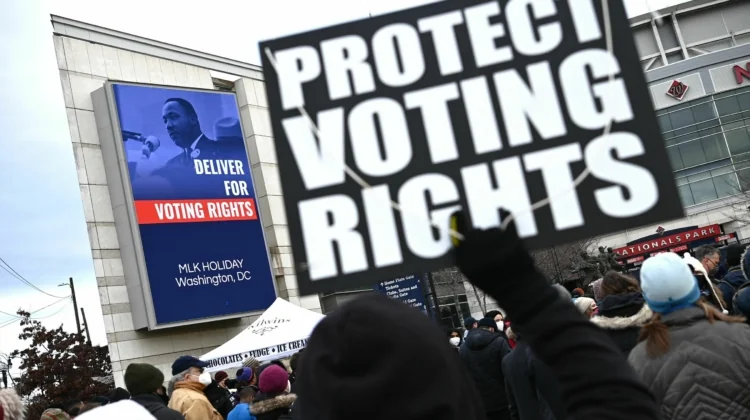
[Want even more content from FPM? Sign up for FPM+ to unlock exclusive series, virtual town-halls with our authors, and more—now for just $3.99/month. Click here to sign up.]
The battle between Texas and Democrat states over gerrymandering seems likely to touch on the biggest driver of Democrat gerrymandering which fundamentally altered the political balance of power in state after state. Louisiana v. Callais is likely headed for a big Supreme Court decision that will fundamentally change how the Voting Rights Act enforces minority districts.
There’s nothing to celebrate about the 60th anniversary of the VRA, a civil rights era relic which long ago stopped fighting segregation and instead enforced partisan gerrymandering with no end in sight. When the Supreme Court began allowing VRA ‘monitoring’ of elections in some states to sunset, Democrats cried that segregation and slavery were about to come back.
But for all the talk of democracy and racism, Louisiana v. Callais shows what keeping the zombie VRA alive is really about. The case is about whether federal courts can force Louisiana to create two Democrat congressional seats under the guise of creating two black seats. It’s a common form of gerrymandering that uses race as a trojan horse for mandating Dem seats.
When heavily gerrymandered Democrat states like California, New York and Illinois eliminate Republican seats, that’s not seen as a Voting Rights Act violation even though much as Democrat seats are disproportionately minority, Republican seats are disproportionately white.
Democrats are not fighting to keep the VRA alive because they care about black people, but because they care about maintaining the racially gerrymandered seats produced by VRA abuses. A New York Times column by Jamelle Bouie complained that “the current Supreme Court’s vision of a rigidly colorblind Constitution” would lead it to reject the notion that the Constitution mandates majority black and therefore Democrat districts. But if the issue were about racial disenfranchisement, Democrats would try to boost the power of black voters by making them a crucial swing bloc in key races instead of apportioning guaranteed seats to senile members of the Congressional Black Caucus who hardly bother running anymore.
Over in Texas, at the center of a national gerrymandering civil war, did the increasingly demented Rep. Al Green, Rep. Jasmine Crockett, the late Rep. Sheila Jackson Lee, who died last year, only to be replaced by Rep. Sylvester Turner, who died this year do any more for black people than their white opposite numbers have done for white people? The amount of scandals, ethics violations and criminal investigations that follow Congressional Black Caucus members is ample evidence of that. The average age of CBC leaders with a lifetime sinecure is in the 70s.
Abusing the VRA to create minority seats for Democrats who couldn’t lose an election unless they were actually locked up for their criminal careers didn’t empower black people, it empowered the Democrats. And that racial gerrymandering gave Democrats guaranteed seats.
The underlying question being asked 60 years later in Louisiana v. Callais is whether black people can be represented by representatives from other races, and whether the same is true for all of America’s other racial, ethnic and religious groups. Despite reams of critical race theory propaganda, the 1619 Project, the career of lucrative literary racists like Ta-Nehisi Coates and Ibram X. Kendi, and the BLM riots, there’s no reason to believe in racially segregated districts.
If having white people represent districts with black voters in it was really unthinkable, how can the Democrats justify the career of Rep. Steve Cohen, who has represented a majority black district, along with Rep. Shri Thanedar and Rep. Rashida Tlaib, and vice versa, quite a few of the younger black Democrats have been elected from majority white congressional districts.
Democrats don’t actually believe that black districts need black representatives, or they would have long ago booted third world carpetbaggers like Tlaib and Thanedar, along with the loathsome Cohen who once bragged that he was an honorary black man because he was driving a broken down car and dating his own daughter. What they do believe is that black districts are more likely to elect Dems of whatever race and so they gerrymander them.
The Voting Rights Act long ago turned into illegal racial gerrymandering and if more of it is chipped away, it will make it possible for Texas to determine districts for political, not racial reasons, and while gerrymandering may not be ideal, the only thing worse than depriving people of political power, forcing them into laughably shaped districts and denying them representation, for their political views is doing all that because of their race. And that’s what the VRA has been doing.
No one is entitled to a congressional seat on account of their race. That notion is as blatantly racist as the abuses that originally led to measures like the Voting Rights Act. Despite the best effort of a civil rights movement that long soured from opposing segregation to supporting it, the whole point of desegregation is, as Martin Luther King said, is choosing content of character over skin color. And content of character does not have a guaranteed two seats in Louisiana.
Or anywhere else.
There are genuine solutions to gerrymandering. They include outlawing districts shaped like a frightened snail trying to escape from an earthquake. Texas has upped the ante for either escalating gerrymandering or negotiating a compact to end the gerrymandering arms race. And if the Supreme Court rules wisely in Louisiana v. Callais, it can help end racial gerrymandering.
The best way to end racism, segregation, racial discrimination and all the other baskets of racial ills is to stop practicing it. The opposite of racism isn’t anti-racism, it’s non-racism. A multiracial Supreme Court has the opportunity to end one of the final vestiges of actual systemic racism.
And send the message that the right to vote isn’t a racial entitlement, it’s an American one.
















